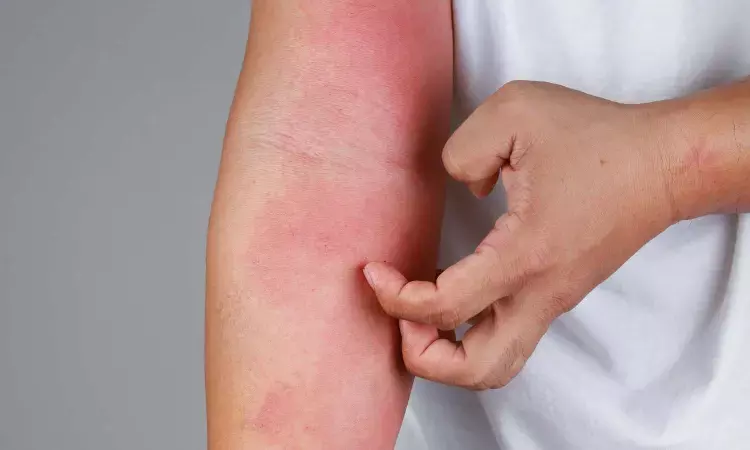- Home
- Medical news & Guidelines
- Anesthesiology
- Cardiology and CTVS
- Critical Care
- Dentistry
- Dermatology
- Diabetes and Endocrinology
- ENT
- Gastroenterology
- Medicine
- Nephrology
- Neurology
- Obstretics-Gynaecology
- Oncology
- Ophthalmology
- Orthopaedics
- Pediatrics-Neonatology
- Psychiatry
- Pulmonology
- Radiology
- Surgery
- Urology
- Laboratory Medicine
- Diet
- Nursing
- Paramedical
- Physiotherapy
- Health news
- Fact Check
- Bone Health Fact Check
- Brain Health Fact Check
- Cancer Related Fact Check
- Child Care Fact Check
- Dental and oral health fact check
- Diabetes and metabolic health fact check
- Diet and Nutrition Fact Check
- Eye and ENT Care Fact Check
- Fitness fact check
- Gut health fact check
- Heart health fact check
- Kidney health fact check
- Medical education fact check
- Men's health fact check
- Respiratory fact check
- Skin and hair care fact check
- Vaccine and Immunization fact check
- Women's health fact check
- AYUSH
- State News
- Andaman and Nicobar Islands
- Andhra Pradesh
- Arunachal Pradesh
- Assam
- Bihar
- Chandigarh
- Chattisgarh
- Dadra and Nagar Haveli
- Daman and Diu
- Delhi
- Goa
- Gujarat
- Haryana
- Himachal Pradesh
- Jammu & Kashmir
- Jharkhand
- Karnataka
- Kerala
- Ladakh
- Lakshadweep
- Madhya Pradesh
- Maharashtra
- Manipur
- Meghalaya
- Mizoram
- Nagaland
- Odisha
- Puducherry
- Punjab
- Rajasthan
- Sikkim
- Tamil Nadu
- Telangana
- Tripura
- Uttar Pradesh
- Uttrakhand
- West Bengal
- Medical Education
- Industry
Upadacitinib exhibits Efficacy and High Retention in Atopic Dermatitis Treatment, reveals study

Real-world data from Australian patients show that upadacitinib demonstrates strong efficacy in treating atopic dermatitis, with a high treatment retention rate and a 90.5% survival probability at four weeks. This research, carried out by a group under Nadine Abu-Ghazaleh at the Royal Melbourne Hospital, indicates the high rates of persistence of this biologic drug in real-world practice, affirming its practical efficacy and long-term performance. The research is particularly relevant with the hitherto scarce Australian evidence regarding upadacitinib in atopic dermatitis, although it has been listed on the Pharmaceutical Benefits Scheme (PBS). The study was published in the Australasian Journal of Dermatology.
The study team conducted a retrospective analysis based on data obtained from the Royal Melbourne Hospital's BioGrid Database and electronic medical records. Participants were adults aged 18 years and above with moderate-to-severe chronic atopic dermatitis who had at least one upadacitinib prescription via PBS or a Compassionate Supply program. Patient demographics, comorbidities, EASI scores, Dermatology Life Quality Index (DLQI) scores, and previous treatments were collected.
The main outcome was treatment persistence, defined as the time from upadacitinib initiation until discontinuation, switch to a different biologic, or death. Reasons for discontinuation were closely recorded, including factors such as side effects, infections, practical barriers, failure to respond, or secondary loss of response.
Key Findings
• The results of the study showed excellent treatment retention with upadacitinib in clinical practice:
• 90.5% of the patients were still on upadacitinib at week 4, reflecting a very high short-term rate of medication continuation.
• Discontinuations were due to many reasons, such as adverse events, infections, loss of efficacy, and logistical issues.
• 50% of 14 patients who had switched from dupilumab to upadacitinib reported loss of efficacy as the primary reason for switching, and 28.6% switched because dupilumab was completely not effective.
• The research established that loss of treatment effect was most commonly identified by patients and corroborated by dermatologists with clinical indicators like increasing EASI scores.
• Patient variables at baseline were the variables like comorbid asthma, history of smoking, and previous use of biologics, but none of these had a strong influence on persistence rates in the short term.
This real-world analysis in Australia showed that upadacitinib has high treatment retention rates among moderate-to-severe atopic dermatitis patients, 90.5% at 4 weeks. Loss of efficacy was the most common reason for discontinuation, especially among dupilumab-pretreated patients. The results are helpful for clinicians selecting biologic therapies and support the practical, long-lasting place for upadacitinib in the treatment of atopic dermatitis.
Reference:
Abu-Ghazaleh, N., Ross, G. and Morgan, V. (2025), Upadacitinib Drug Survival in the Management of Patients With Moderate to Severe Atopic Dermatitis: Real-Time Data From the Biogrid Database Registry. Australas J Dermatol. https://doi.org/10.1111/ajd.14469.
Dr Riya Dave has completed dentistry from Gujarat University in 2022. She is a dentist and accomplished medical and scientific writer known for her commitment to bridging the gap between clinical expertise and accessible healthcare information. She has been actively involved in writing blogs related to health and wellness.
Dr Kamal Kant Kohli-MBBS, DTCD- a chest specialist with more than 30 years of practice and a flair for writing clinical articles, Dr Kamal Kant Kohli joined Medical Dialogues as a Chief Editor of Medical News. Besides writing articles, as an editor, he proofreads and verifies all the medical content published on Medical Dialogues including those coming from journals, studies,medical conferences,guidelines etc. Email: drkohli@medicaldialogues.in. Contact no. 011-43720751


